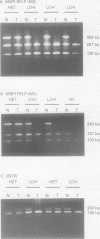Abstract
AIM: To investigate the role of DCC gene inactivation in the development and progression of gastric cancer. METHODS: Loss of heterozygosity and loss of expression of the DCC gene was studied in 51 surgical specimens of gastric cancer using detection based on polymerase chain reaction. RESULTS: Loss of heterozygosity was found in 35.3% (18 of 51) of specimens and was detected more often in stage III and IV (50%) than in stage I and II cancers (14.3%) (p < 0.05). Occurrence of loss of heterozygosity was not correlated with histological type, tumour size, depth of invasion, or lymph node metastasis. Loss of expression was found in 49% of cases (25 of 51). Loss of expression was not significantly correlated with any clinicopathological variable. CONCLUSIONS: Loss of heterozygosity and loss of expression of the DCC gene are often encountered in gastric cancer. Loss of heterozygosity of the DCC gene is a late event and associated with malignant progression.
Full text
PDF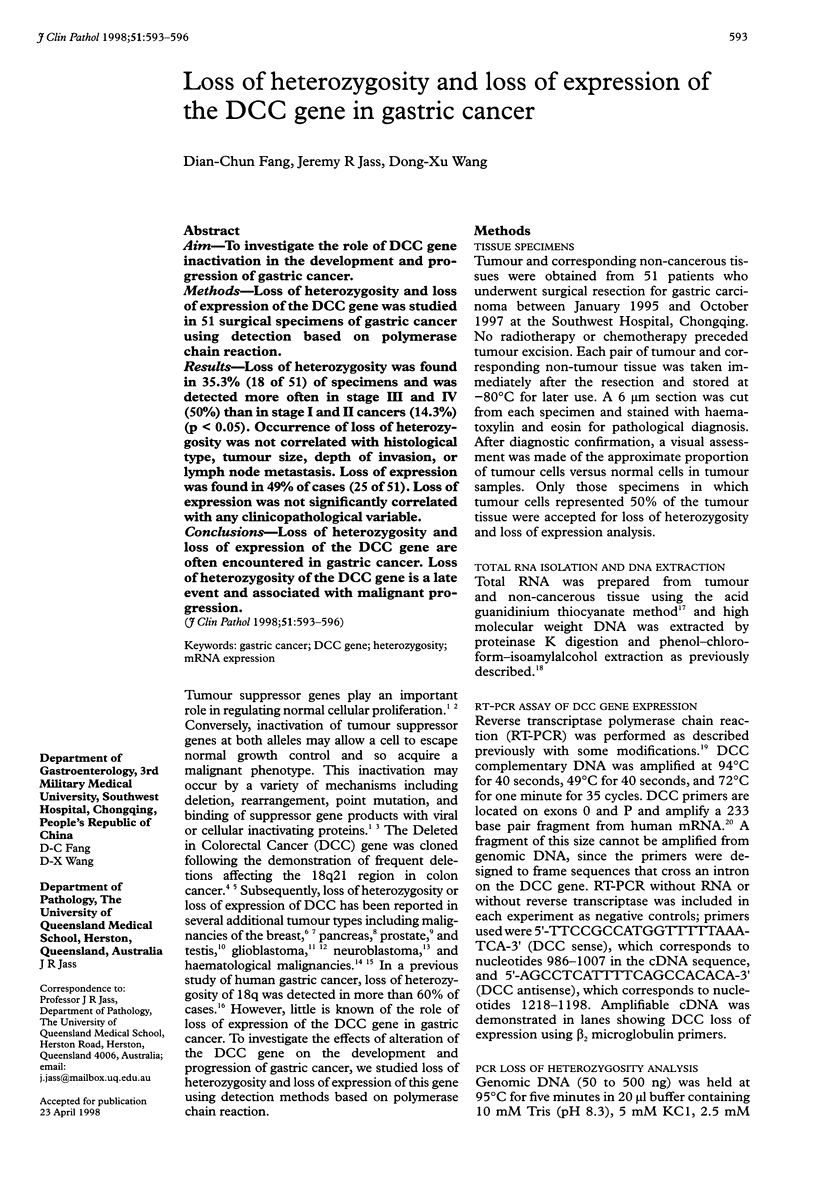
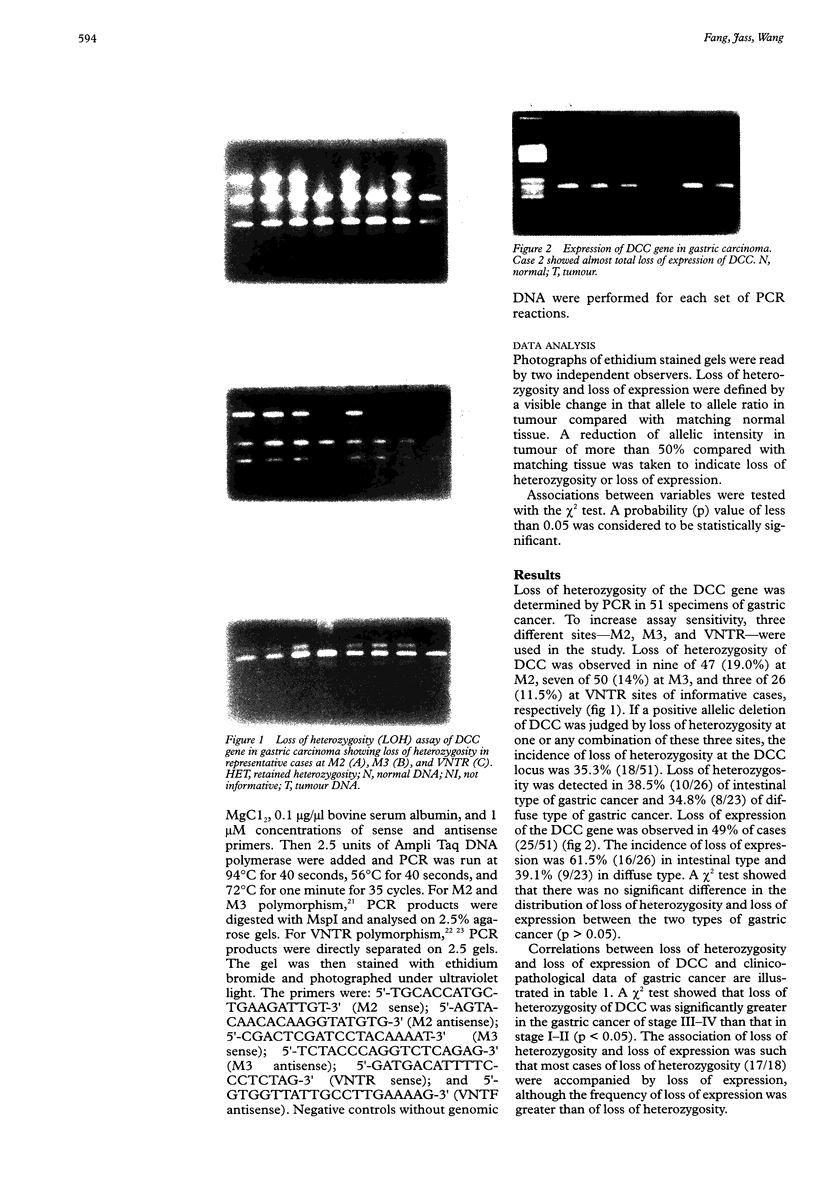
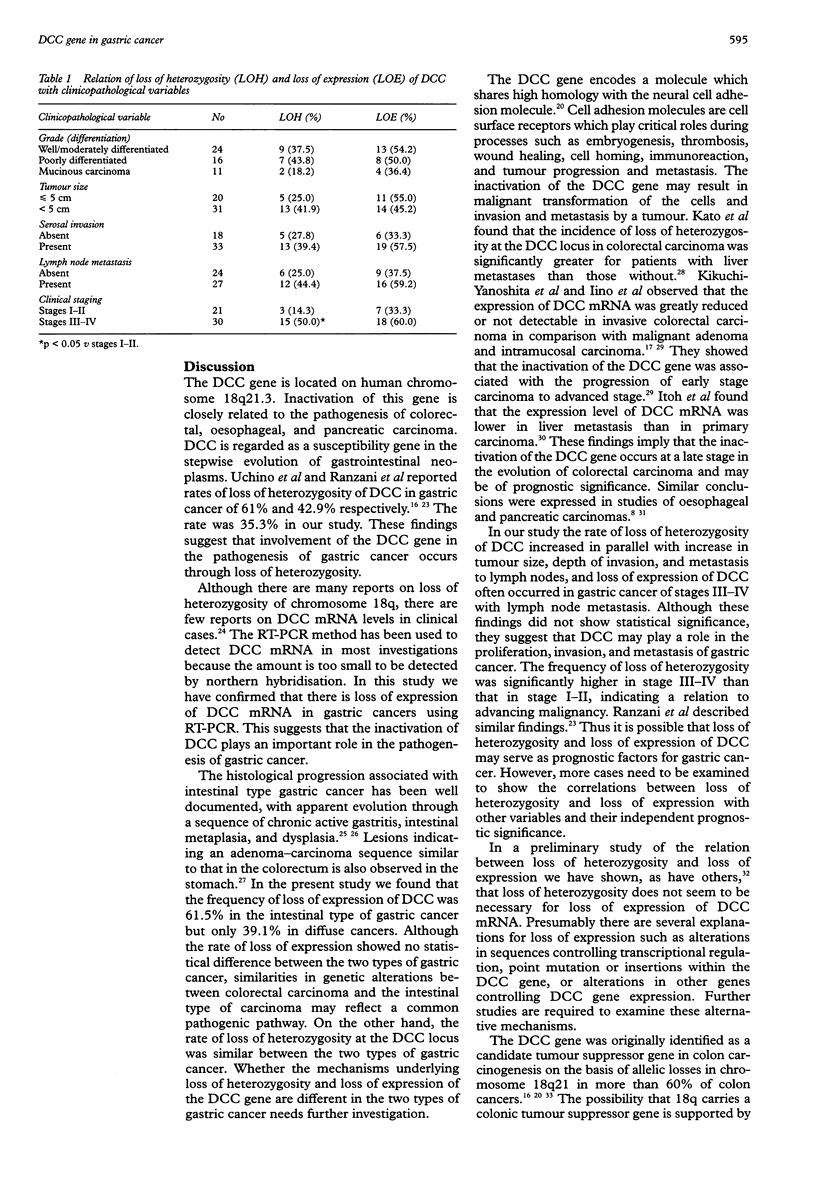
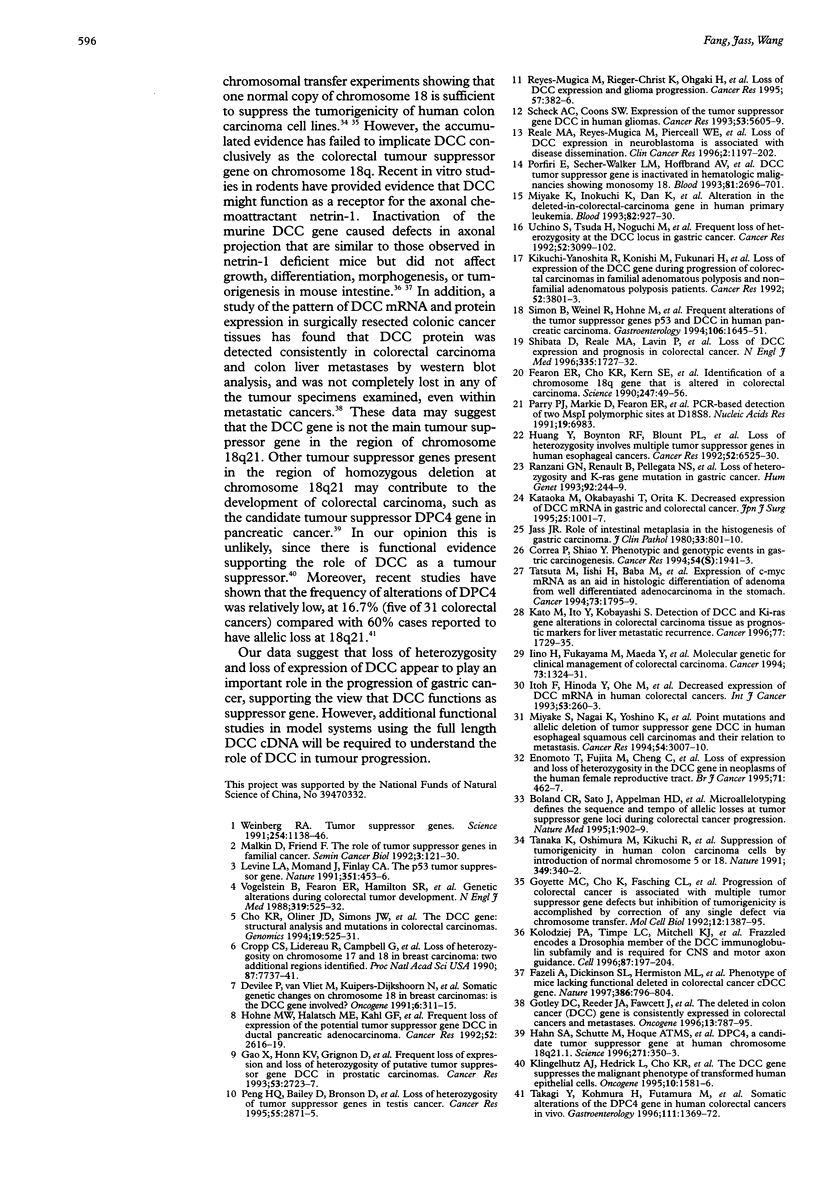
Images in this article
Selected References
These references are in PubMed. This may not be the complete list of references from this article.
- Boland C. R., Sato J., Appelman H. D., Bresalier R. S., Feinberg A. P. Microallelotyping defines the sequence and tempo of allelic losses at tumour suppressor gene loci during colorectal cancer progression. Nat Med. 1995 Sep;1(9):902–909. doi: 10.1038/nm0995-902. [DOI] [PubMed] [Google Scholar]
- Cho K. R., Oliner J. D., Simons J. W., Hedrick L., Fearon E. R., Preisinger A. C., Hedge P., Silverman G. A., Vogelstein B. The DCC gene: structural analysis and mutations in colorectal carcinomas. Genomics. 1994 Feb;19(3):525–531. doi: 10.1006/geno.1994.1102. [DOI] [PubMed] [Google Scholar]
- Cropp C. S., Lidereau R., Campbell G., Champene M. H., Callahan R. Loss of heterozygosity on chromosomes 17 and 18 in breast carcinoma: two additional regions identified. Proc Natl Acad Sci U S A. 1990 Oct;87(19):7737–7741. doi: 10.1073/pnas.87.19.7737. [DOI] [PMC free article] [PubMed] [Google Scholar]
- Devilee P., van Vliet M., Kuipers-Dijkshoorn N., Pearson P. L., Cornelisse C. J. Somatic genetic changes on chromosome 18 in breast carcinomas: is the DCC gene involved? Oncogene. 1991 Feb;6(2):311–315. [PubMed] [Google Scholar]
- Enomoto T., Fujita M., Cheng C., Nakashima R., Ozaki M., Inoue M., Nomura T. Loss of expression and loss of heterozygosity in the DCC gene in neoplasms of the human female reproductive tract. Br J Cancer. 1995 Mar;71(3):462–467. doi: 10.1038/bjc.1995.94. [DOI] [PMC free article] [PubMed] [Google Scholar]
- Fazeli A., Dickinson S. L., Hermiston M. L., Tighe R. V., Steen R. G., Small C. G., Stoeckli E. T., Keino-Masu K., Masu M., Rayburn H. Phenotype of mice lacking functional Deleted in colorectal cancer (Dcc) gene. Nature. 1997 Apr 24;386(6627):796–804. doi: 10.1038/386796a0. [DOI] [PubMed] [Google Scholar]
- Fearon E. R., Cho K. R., Nigro J. M., Kern S. E., Simons J. W., Ruppert J. M., Hamilton S. R., Preisinger A. C., Thomas G., Kinzler K. W. Identification of a chromosome 18q gene that is altered in colorectal cancers. Science. 1990 Jan 5;247(4938):49–56. doi: 10.1126/science.2294591. [DOI] [PubMed] [Google Scholar]
- Gao X., Honn K. V., Grignon D., Sakr W., Chen Y. Q. Frequent loss of expression and loss of heterozygosity of the putative tumor suppressor gene DCC in prostatic carcinomas. Cancer Res. 1993 Jun 15;53(12):2723–2727. [PubMed] [Google Scholar]
- Gotley D. C., Reeder J. A., Fawcett J., Walsh M. D., Bates P., Simmons D. L., Antalis T. M. The deleted in colon cancer (DCC) gene is consistently expressed in colorectal cancers and metastases. Oncogene. 1996 Aug 15;13(4):787–795. [PubMed] [Google Scholar]
- Goyette M. C., Cho K., Fasching C. L., Levy D. B., Kinzler K. W., Paraskeva C., Vogelstein B., Stanbridge E. J. Progression of colorectal cancer is associated with multiple tumor suppressor gene defects but inhibition of tumorigenicity is accomplished by correction of any single defect via chromosome transfer. Mol Cell Biol. 1992 Mar;12(3):1387–1395. doi: 10.1128/mcb.12.3.1387. [DOI] [PMC free article] [PubMed] [Google Scholar]
- Hahn S. A., Schutte M., Hoque A. T., Moskaluk C. A., da Costa L. T., Rozenblum E., Weinstein C. L., Fischer A., Yeo C. J., Hruban R. H. DPC4, a candidate tumor suppressor gene at human chromosome 18q21.1. Science. 1996 Jan 19;271(5247):350–353. doi: 10.1126/science.271.5247.350. [DOI] [PubMed] [Google Scholar]
- Huang Y., Boynton R. F., Blount P. L., Silverstein R. J., Yin J., Tong Y., McDaniel T. K., Newkirk C., Resau J. H., Sridhara R. Loss of heterozygosity involves multiple tumor suppressor genes in human esophageal cancers. Cancer Res. 1992 Dec 1;52(23):6525–6530. [PubMed] [Google Scholar]
- Höhne M. W., Halatsch M. E., Kahl G. F., Weinel R. J. Frequent loss of expression of the potential tumor suppressor gene DCC in ductal pancreatic adenocarcinoma. Cancer Res. 1992 May 1;52(9):2616–2619. [PubMed] [Google Scholar]
- Iino H., Fukayama M., Maeda Y., Koike M., Mori T., Takahashi T., Kikuchi-Yanoshita R., Miyaki M., Mizuno S., Watanabe S. Molecular genetics for clinical management of colorectal carcinoma. 17p, 18q, and 22q loss of heterozygosity and decreased DCC expression are correlated with the metastatic potential. Cancer. 1994 Mar 1;73(5):1324–1331. doi: 10.1002/1097-0142(19940301)73:5<1324::aid-cncr2820730503>3.0.co;2-w. [DOI] [PubMed] [Google Scholar]
- Itoh F., Hinoda Y., Ohe M., Ohe Y., Ban T., Endo T., Imai K., Yachi A. Decreased expression of DCC mRNA in human colorectal cancers. Int J Cancer. 1993 Jan 21;53(2):260–263. doi: 10.1002/ijc.2910530215. [DOI] [PubMed] [Google Scholar]
- Jass J. R. Role of intestinal metaplasia in the histogenesis of gastric carcinoma. J Clin Pathol. 1980 Sep;33(9):801–810. doi: 10.1136/jcp.33.9.801. [DOI] [PMC free article] [PubMed] [Google Scholar]
- Kataoka M., Okabayashi T., Orita K. Decreased expression of DCC mRNA in gastric and colorectal cancer. Surg Today. 1995;25(12):1001–1007. doi: 10.1007/BF00311682. [DOI] [PubMed] [Google Scholar]
- Kato M., Ito Y., Kobayashi S., Isono K. Detection of DCC and Ki-ras gene alterations in colorectal carcinoma tissue as prognostic markers for liver metastatic recurrence. Cancer. 1996 Apr 15;77(8 Suppl):1729–1735. doi: 10.1002/(SICI)1097-0142(19960415)77:8<1729::AID-CNCR47>3.0.CO;2-Z. [DOI] [PubMed] [Google Scholar]
- Kikuchi-Yanoshita R., Konishi M., Fukunari H., Tanaka K., Miyaki M. Loss of expression of the DCC gene during progression of colorectal carcinomas in familial adenomatous polyposis and non-familial adenomatous polyposis patients. Cancer Res. 1992 Jul 1;52(13):3801–3803. [PubMed] [Google Scholar]
- Klingelhutz A. J., Hedrick L., Cho K. R., McDougall J. K. The DCC gene suppresses the malignant phenotype of transformed human epithelial cells. Oncogene. 1995 Apr 20;10(8):1581–1586. [PubMed] [Google Scholar]
- Kolodziej P. A., Timpe L. C., Mitchell K. J., Fried S. R., Goodman C. S., Jan L. Y., Jan Y. N. frazzled encodes a Drosophila member of the DCC immunoglobulin subfamily and is required for CNS and motor axon guidance. Cell. 1996 Oct 18;87(2):197–204. doi: 10.1016/s0092-8674(00)81338-0. [DOI] [PubMed] [Google Scholar]
- Levine A. J., Momand J., Finlay C. A. The p53 tumour suppressor gene. Nature. 1991 Jun 6;351(6326):453–456. doi: 10.1038/351453a0. [DOI] [PubMed] [Google Scholar]
- Malkin D., Friend S. H. The role of tumour suppressor genes in familial cancer. Semin Cancer Biol. 1992 Jun;3(3):121–130. [PubMed] [Google Scholar]
- Miyake K., Inokuchi K., Dan K., Nomura T. Alterations in the deleted in colorectal carcinoma gene in human primary leukemia. Blood. 1993 Aug 1;82(3):927–930. [PubMed] [Google Scholar]
- Miyake S., Nagai K., Yoshino K., Oto M., Endo M., Yuasa Y. Point mutations and allelic deletion of tumor suppressor gene DCC in human esophageal squamous cell carcinomas and their relation to metastasis. Cancer Res. 1994 Jun 1;54(11):3007–3010. [PubMed] [Google Scholar]
- Parry P. J., Markie D., Fearon E. R., Nigro J. M., Vogelstein B., Bodmer W. F. PCR-based detection of two MspI polymorphic sites at D18S8. Nucleic Acids Res. 1991 Dec 25;19(24):6983–6983. doi: 10.1093/nar/19.24.6983-a. [DOI] [PMC free article] [PubMed] [Google Scholar]
- Peng H. Q., Bailey D., Bronson D., Goss P. E., Hogg D. Loss of heterozygosity of tumor suppressor genes in testis cancer. Cancer Res. 1995 Jul 1;55(13):2871–2875. [PubMed] [Google Scholar]
- Porfiri E., Secker-Walker L. M., Hoffbrand A. V., Hancock J. F. DCC tumor suppressor gene is inactivated in hematologic malignancies showing monosomy 18. Blood. 1993 May 15;81(10):2696–2701. [PubMed] [Google Scholar]
- Ranzani G. N., Renault B., Pellegata N. S., Fattorini P., Magni E., Bacci F., Amadori D. Loss of heterozygosity and K-ras gene mutations in gastric cancer. Hum Genet. 1993 Oct 1;92(3):244–249. doi: 10.1007/BF00244466. [DOI] [PubMed] [Google Scholar]
- Reyes-Mugica M., Rieger-Christ K., Ohgaki H., Ekstrand B. C., Helie M., Kleinman G., Yahanda A., Fearon E. R., Kleihues P., Reale M. A. Loss of DCC expression and glioma progression. Cancer Res. 1997 Feb 1;57(3):382–386. [PubMed] [Google Scholar]
- Scheck A. C., Coons S. W. Expression of the tumor suppressor gene DCC in human gliomas. Cancer Res. 1993 Dec 1;53(23):5605–5609. [PubMed] [Google Scholar]
- Shibata D., Reale M. A., Lavin P., Silverman M., Fearon E. R., Steele G., Jr, Jessup J. M., Loda M., Summerhayes I. C. The DCC protein and prognosis in colorectal cancer. N Engl J Med. 1996 Dec 5;335(23):1727–1732. doi: 10.1056/NEJM199612053352303. [DOI] [PubMed] [Google Scholar]
- Simon B., Weinel R., Höhne M., Watz J., Schmidt J., Körtner G., Arnold R. Frequent alterations of the tumor suppressor genes p53 and DCC in human pancreatic carcinoma. Gastroenterology. 1994 Jun;106(6):1645–1651. doi: 10.1016/0016-5085(94)90422-7. [DOI] [PubMed] [Google Scholar]
- Takagi Y., Kohmura H., Futamura M., Kida H., Tanemura H., Shimokawa K., Saji S. Somatic alterations of the DPC4 gene in human colorectal cancers in vivo. Gastroenterology. 1996 Nov;111(5):1369–1372. doi: 10.1053/gast.1996.v111.pm8898652. [DOI] [PubMed] [Google Scholar]
- Tanaka K., Oshimura M., Kikuchi R., Seki M., Hayashi T., Miyaki M. Suppression of tumorigenicity in human colon carcinoma cells by introduction of normal chromosome 5 or 18. Nature. 1991 Jan 24;349(6307):340–342. doi: 10.1038/349340a0. [DOI] [PubMed] [Google Scholar]
- Tatsuta M., Iishi H., Baba M., Nakaizumi A., Uehara H., Taniguchi H. Expression of c-myc mRNA as an aid in histologic differentiation of adenoma from well differentiated adenocarcinoma in the stomach. Cancer. 1994 Apr 1;73(7):1795–1799. doi: 10.1002/1097-0142(19940401)73:7<1795::aid-cncr2820730704>3.0.co;2-x. [DOI] [PubMed] [Google Scholar]
- Uchino S., Tsuda H., Noguchi M., Yokota J., Terada M., Saito T., Kobayashi M., Sugimura T., Hirohashi S. Frequent loss of heterozygosity at the DCC locus in gastric cancer. Cancer Res. 1992 Jun 1;52(11):3099–3102. [PubMed] [Google Scholar]
- Vogelstein B., Fearon E. R., Hamilton S. R., Kern S. E., Preisinger A. C., Leppert M., Nakamura Y., White R., Smits A. M., Bos J. L. Genetic alterations during colorectal-tumor development. N Engl J Med. 1988 Sep 1;319(9):525–532. doi: 10.1056/NEJM198809013190901. [DOI] [PubMed] [Google Scholar]
- Weinberg R. A. Tumor suppressor genes. Science. 1991 Nov 22;254(5035):1138–1146. doi: 10.1126/science.1659741. [DOI] [PubMed] [Google Scholar]




